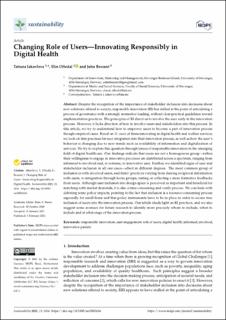| dc.contributor.author | Iakovleva, Tatiana Aleksandrovna | |
| dc.contributor.author | Oftedal, Elin Merethe | |
| dc.contributor.author | Bessant, John Robert | |
| dc.date.accessioned | 2023-02-15T08:35:27Z | |
| dc.date.available | 2023-02-15T08:35:27Z | |
| dc.date.created | 2021-02-12T09:41:14Z | |
| dc.date.issued | 2021 | |
| dc.identifier.citation | Iakovleva, T., Oftedal, E., & Bessant, J. (2021). Changing Role of Users—Innovating Responsibly in Digital Health. Sustainability, 13(4), 1616. | en_US |
| dc.identifier.issn | 2071-1050 | |
| dc.identifier.uri | https://hdl.handle.net/11250/3050921 | |
| dc.description.abstract | Despite the recognition of the importance of stakeholder inclusion into decisions about new solutions offered to society, responsible innovation (RI) has stalled at the point of articulating a process of governance with a strongly normative loading, without clear practical guidelines toward implementation practices. The principles of RI direct us to involve the user early in the innovation process. However, it lacks direction of how to involve users and stakeholders into this process. In this article, we try to understand how to empower users to become a part of innovation process though empirical cases. Based on 11 cases of firms innovating in digital health and welfare services, we look on firm practices for user integration into their innovation process, as well as how the user’s behavior is changing due to new trends such as availability of information and digitalization of services. We try to explore this question through lenses of responsible innovation in the emerging field of digital healthcare. Our findings indicate that users are not a homogenous group—rather, their willingness to engage in innovative processes are distributed across a spectrum, ranging from informed to involved and, at extreme, to innovative user. Further, we identified signs of user and stakeholder inclusion in all our cases—albeit in different degrees. The most common group of inclusion is with involved users, and firms’ practices varying from sharing reciprocal information with users, to integration through focus groups, testing or collecting a more formative feedbacks from users. Although user inclusion into design space is perceived as important and beneficial for matching with market demands, it is also a time-consuming and costly process. We conclude with debating some policy impacts, pointing to the fact that inclusion is a resource-consuming process especially for small firms and that policy instruments have to be in place in order to secure true inclusion of users into the innovation process. Our article sheds light on RI practices, and we also suggest some avenues for future research to identify more precisely whom to include, when to include and at what stage of the innovation process. | en_US |
| dc.language.iso | eng | en_US |
| dc.publisher | MDPI | en_US |
| dc.rights | Navngivelse 4.0 Internasjonal | * |
| dc.rights.uri | http://creativecommons.org/licenses/by/4.0/deed.no | * |
| dc.title | Changing role of users : Innovating responsibly in digital health | en_US |
| dc.type | Peer reviewed | en_US |
| dc.type | Journal article | en_US |
| dc.description.version | publishedVersion | en_US |
| dc.rights.holder | The authors | en_US |
| dc.subject.nsi | VDP::Samfunnsvitenskap: 200 | en_US |
| dc.subject.nsi | VDP::Medisinske Fag: 700 | en_US |
| dc.source.volume | 13 | en_US |
| dc.source.journal | Sustainability | en_US |
| dc.source.issue | 4 | en_US |
| dc.identifier.doi | 10.3390/su13041616 | |
| dc.identifier.cristin | 1889064 | |
| dc.relation.project | Norges forskningsråd: 299192 | en_US |
| cristin.ispublished | true | |
| cristin.fulltext | original | |
| cristin.qualitycode | 1 | |

